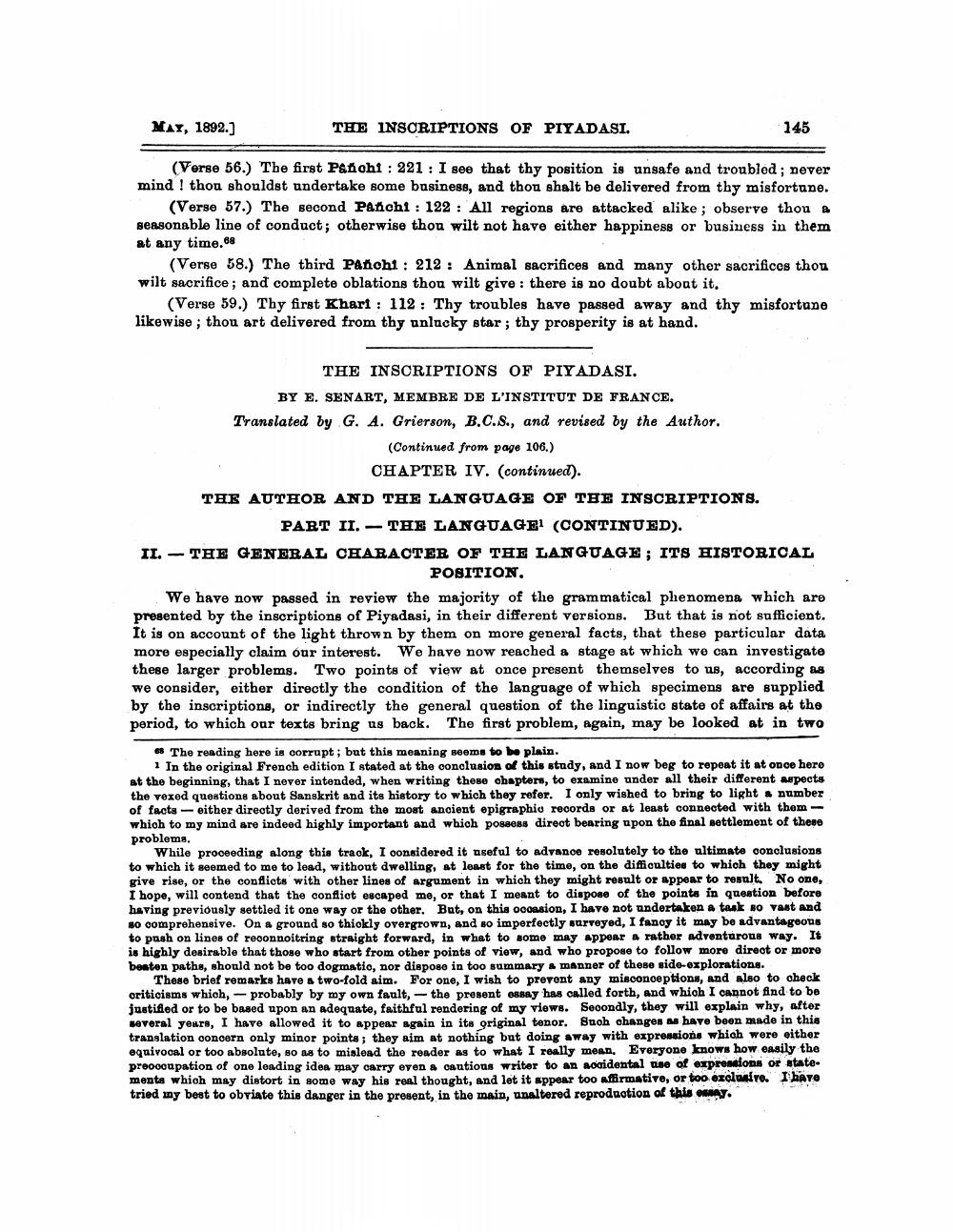________________
MAY, 1892.]
THE INSCRIPTIONS OF PIYADASI.
145
(Verse 56.) The first Panoht : 221 : I see that thy position is unsafe and troubled; never mind I thou shouldet undertake some business, and thou shalt be delivered from thy misfortune.
(Verse 57.) The second panohi : 122 : All regions are attacked alike; observe thou a seasonable line of conduct; otherwise thou wilt not have either happiness or business in them at any time.68
(Verse 58.) The third Panohi : 212 : Animal sacrifices and many other sacrifices thou wilt sacrifice; and complete oblations thou wilt give : there is no doubt about it.
(Verse 59.) Thy first Khari: 112 : Thy troubles have passed away and thy misfortune likewise, thou art delivered from thy unlucky star; thy prosperity is at hand.
THE INSCRIPTIONS OF PIYADASI. BY E. SENART, MEMBRE DE L'INSTITUT DE FRANCE. Translated by G. A. Grierson, B.C.S., and revised by the Author.
(Continued from page 106.)
CHAPTER IV. (continued). THE AUTHOR AND THE LANGUAGE OF THE INSCRIPTIONS.
PART II. - THE LANGUAGE (CONTINUED). II. - THE GENERAL CHARACTER OF THE LANGUAGE; ITS HISTORICAL
POSITION We have now passed in review the majority of the grammatical phenomena which are presented by the inscriptions of Piyadasi, in their different versions. But that is not sufficient. It is on account of the light thrown by them on more general facts, that these particular data more especially claim our interest. We have now reached a stage at which we can investigate these larger problems. Two points of view at once present themselves to us, according as we consider, either directly the condition of the language of which specimens are supplied by the inscriptions, or indirectly the general question of the linguistic state of affairs at the period, to which our texts bring us back. The first problem, again, may be looked at in two
68 The reading here is corrupt; but this meaning seems to be plain.
1 In the original French edition I stated at the conclusion of this study, and I now beg to repeat it at once hero at the beginning, that I never intended, when writing these chapters, to examine under all their different aspects the vexed questions about Sanskrit and its history to which they refer. I only wished to bring to light number of facts - either directly derived from the most ancient epigraphic records or at least connected with them which to my mind are indeed highly important and which possess direct bearing upon the final settlement of these problems.
While proceeding along this track, I considered it useful to advance resolutely to the ultimate conclusions to which it seemed to me to lead, without dwelling, at least for the time, on the difficulties to which they might give rise, or the conflicts with other lines of argument in which they might result or appear to result. No one, I hope, will contend that the conflict escaped me, or that I meant to dispose of the points in question before having previously settled it one way or the other. But, on this occasion, I have not undertaken a tak so vast and Ho comprehensive. On a ground so thiokly overgrown, and so imperfectly surveyed, I fanoy it may be advantageous to pash on lines of reconnoitring straight forward, in what to some may appear a rather adventurous way. It is highly desirable that those who start from other points of view, and who propose to follow more direct or moro benton paths, should not be too dogmatio, nor dispose in too summary a manner of these side-explorations.
These brief remarks have a two-fold aim. For one, I wish to prevent any misconceptions, and also to check oriticisms which, - probably by my own fault, the present essay has called forth, and which I cannot find to be justified or to be based upon an adequate, faithful rendering of my views. Seoondly, they will explain why, after several years, I have allowed it to appear again in its original tenor. Buoh changes as have been made in this translation concern only minor points, they aim at nothing but doing away with expressions which were either equivocal or too absolute, so as to mislead the reader as to what I really mean. Everyone knows how easily the prooooupation of one leading idea may carry even a cautious writer to an accidental use of expressions or statements which may distort in some way his real thought, and let it appear too Affirmativo, or too exclure. hATO tried my best to obviate this danger in the present, in the main, unaltered reproduction of two




